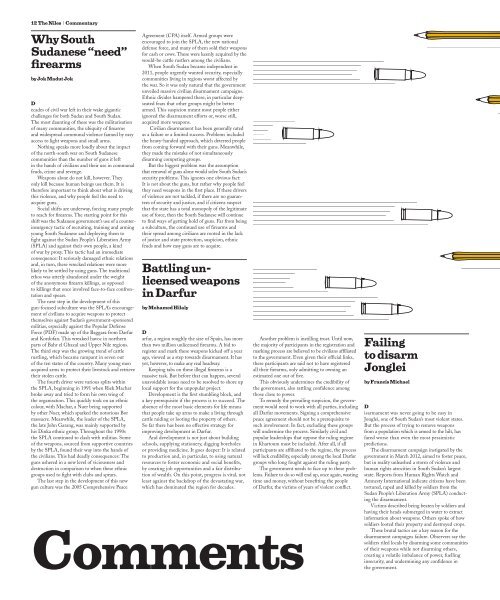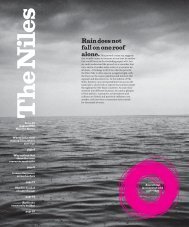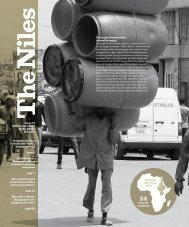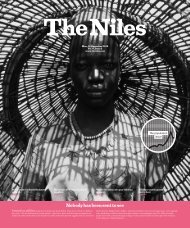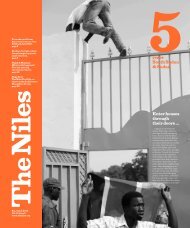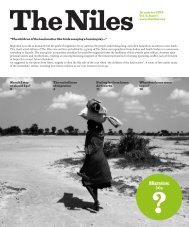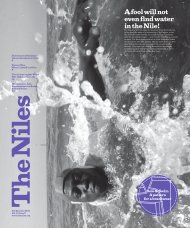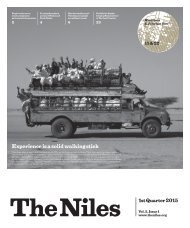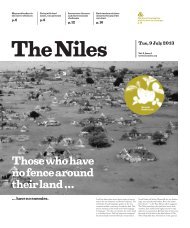If the evil is coming, shut the door...
Approximately three million small arms are circulating in Sudan and South Sudan. In the fourth edition of The Niles, our correspondents from both countries take a closer look: Where do the weapons come from? What societal role do they play? But most importantly: How many weapons are needed to establish peace and to ensure that the door on evil no longer has to be shut, as the above proverb suggests? A Darfuri fighter (photo), has a practical answer – a collection of talismans meant to protect him from bullets. But will it protect him from the person with his finger on the trigger? Albert Einstein, whose Theory of Relativity was proven in a 1952 experiment carried out in Sudan said: “The world will not be threatened by evil people rather by people who permit it.” Those words ring true here and will hopefully open another door and allow something good to slip in.
Approximately three million small arms are circulating in Sudan and South Sudan. In the fourth edition of The Niles, our correspondents from both countries take a closer look: Where do the weapons come from? What societal role do they play? But most importantly: How many weapons are needed to establish peace and to ensure that the door on evil no longer has to be shut, as the above proverb suggests? A Darfuri fighter (photo), has a practical answer – a collection of talismans meant to protect him from bullets. But will it protect him from the person with his finger on the trigger? Albert Einstein, whose Theory of Relativity was proven in a 1952 experiment carried out in Sudan said: “The world will not be threatened by evil people rather by people who permit it.” Those words ring true here and will hopefully open another door and allow something good to slip in.
You also want an ePaper? Increase the reach of your titles
YUMPU automatically turns print PDFs into web optimized ePapers that Google loves.
12 The Niles | Commentary<br />
Why South<br />
Sudanese “need”<br />
firearms<br />
by Jok Madut Jok<br />
D<br />
ecades of civil war left in <strong>the</strong>ir wake gigantic<br />
challenges for both Sudan and South Sudan.<br />
The most daunting of <strong>the</strong>se was <strong>the</strong> militar<strong>is</strong>ation<br />
of many communities, <strong>the</strong> ubiquity of firearms<br />
and widespread communal violence fanned by easy<br />
access to light weapons and small arms.<br />
Nothing speaks more loudly about <strong>the</strong> impact<br />
of <strong>the</strong> north-south war on South Sudanese<br />
communities than <strong>the</strong> number of guns it left<br />
in <strong>the</strong> hands of civilians and <strong>the</strong>ir use in communal<br />
feuds, crime and revenge.<br />
Weapons alone do not kill, however. They<br />
only kill because human beings use <strong>the</strong>m. It <strong>is</strong><br />
<strong>the</strong>refore important to think about what <strong>is</strong> driving<br />
th<strong>is</strong> violence, and why people feel <strong>the</strong> need to<br />
acquire guns.<br />
Social shifts are underway, forcing many people<br />
to reach for firearms. The starting point for th<strong>is</strong><br />
shift was <strong>the</strong> Sudanese government’s use of a counterinsurgency<br />
tactic of recruiting, training and arming<br />
young South Sudanese and deploying <strong>the</strong>m to<br />
fight against <strong>the</strong> Sudan People’s Liberation Army<br />
(SPLA) and against <strong>the</strong>ir own people, a kind<br />
of war by proxy. Th<strong>is</strong> tactic had an immediate<br />
consequence: It seriously damaged ethnic relations<br />
and, in turn, <strong>the</strong>se wrecked relations were more<br />
likely to be settled by using guns. The traditional<br />
ethos was utterly abandoned under <strong>the</strong> weight<br />
of <strong>the</strong> anonymous firearm killings, as opposed<br />
to killings that once involved face-to-face confrontation<br />
and spears.<br />
The next step in <strong>the</strong> development of th<strong>is</strong><br />
gun-focused subculture was <strong>the</strong> SPLA’s encouragement<br />
of civilians to acquire weapons to protect<br />
<strong>the</strong>mselves against Sudan’s government-sponsored<br />
militias, especially against <strong>the</strong> Popular Defense<br />
Force (PDF) made up of <strong>the</strong> Baggara from Darfur<br />
and Kordofan. Th<strong>is</strong> wreaked havoc in nor<strong>the</strong>rn<br />
parts of Bahr el Ghazal and Upper Nile regions.<br />
The third step was <strong>the</strong> growing trend of cattle<br />
rustling, which became rampant in seven out<br />
of <strong>the</strong> ten states of <strong>the</strong> country. Many young men<br />
acquired arms to protect <strong>the</strong>ir livestock and retrieve<br />
<strong>the</strong>ir stolen cattle.<br />
The fourth driver were various splits within<br />
<strong>the</strong> SPLA, beginning in 1991 when Riek Machar<br />
broke away and tried to form h<strong>is</strong> own wing of<br />
<strong>the</strong> organ<strong>is</strong>ation. Th<strong>is</strong> quickly took on an ethnic<br />
colour, with Machar, a Nuer being supported<br />
by o<strong>the</strong>r Nuer, which sparked <strong>the</strong> notorious Bor<br />
massacre. Meanwhile, <strong>the</strong> leader of <strong>the</strong> SPLA,<br />
<strong>the</strong> late John Garang, was mainly supported by<br />
h<strong>is</strong> Dinka ethnic group. Throughout <strong>the</strong> 1990s<br />
<strong>the</strong> SPLA continued to clash with militias. Some<br />
of <strong>the</strong> weapons, sourced from supportive countries<br />
by <strong>the</strong> SPLA, found <strong>the</strong>ir way into <strong>the</strong> hands of<br />
<strong>the</strong> civilians. Th<strong>is</strong> had deadly consequences: The<br />
guns ushered in a new level of viciousness and<br />
destruction in compar<strong>is</strong>on to when <strong>the</strong>se ethnic<br />
groups used to fight with clubs and spears.<br />
The last step in <strong>the</strong> development of th<strong>is</strong> new<br />
gun culture was <strong>the</strong> 2005 Comprehensive Peace<br />
Agreement (CPA) itself. Armed groups were<br />
encouraged to join <strong>the</strong> SPLA, <strong>the</strong> new national<br />
defense force, and many of <strong>the</strong>m sold <strong>the</strong>ir weapons<br />
for cash or cows. These were keenly acquired by <strong>the</strong><br />
would-be cattle rustlers among <strong>the</strong> civilians.<br />
When South Sudan became independent in<br />
2011, people urgently wanted security, especially<br />
communities living in regions worst affected by<br />
<strong>the</strong> war. So it was only natural that <strong>the</strong> government<br />
unveiled massive civilian d<strong>is</strong>armament campaigns.<br />
Ethnic divides hampered <strong>the</strong>se, in particular deepseated<br />
fears that o<strong>the</strong>r groups might be better<br />
armed. Th<strong>is</strong> suspicion meant most people ei<strong>the</strong>r<br />
ignored <strong>the</strong> d<strong>is</strong>armament efforts or, worse still,<br />
acquired more weapons.<br />
Civilian d<strong>is</strong>armament has been generally rated<br />
as a failure or a limited success. Problems included<br />
<strong>the</strong> heavy-handed approach, which deterred people<br />
from <strong>coming</strong> forward with <strong>the</strong>ir guns. Meanwhile,<br />
<strong>the</strong>y made <strong>the</strong> m<strong>is</strong>take of not simultaneously<br />
d<strong>is</strong>arming competing groups.<br />
But <strong>the</strong> biggest problem was <strong>the</strong> assumption<br />
that removal of guns alone would solve South Sudan’s<br />
security problems. Th<strong>is</strong> ignores one obvious fact:<br />
It <strong>is</strong> not about <strong>the</strong> guns, but ra<strong>the</strong>r why people feel<br />
<strong>the</strong>y need weapons in <strong>the</strong> first place. <strong>If</strong> <strong>the</strong>se drivers<br />
of violence are not tackled, if <strong>the</strong>re are no guarantees<br />
of security and justice, and if citizens suspect<br />
that <strong>the</strong> state has a total monopoly of <strong>the</strong> legitimate<br />
use of force, <strong>the</strong>n <strong>the</strong> South Sudanese will continue<br />
to find ways of getting hold of guns. Far from being<br />
a subculture, <strong>the</strong> continued use of firearms and<br />
<strong>the</strong>ir spread among civilians are rooted in <strong>the</strong> lack<br />
of justice and state protection, suspicion, ethnic<br />
feuds and how easy guns are to acquire.<br />
Battling unlicensed<br />
weapons<br />
in Darfur<br />
by Mohamed Hilaly<br />
D<br />
arfur, a region roughly <strong>the</strong> size of Spain, has more<br />
than two million unlicensed firearms. A bid to<br />
reg<strong>is</strong>ter and mark <strong>the</strong>se weapons kicked off a year<br />
ago, viewed as a step towards d<strong>is</strong>armament. It has<br />
yet, however, to make any real headway.<br />
Keeping tabs on <strong>the</strong>se illegal firearms <strong>is</strong> a<br />
massive task. But before that can happen, several<br />
unavoidable <strong>is</strong>sues need to be resolved to shore up<br />
local support for <strong>the</strong> unpopular project.<br />
Development <strong>is</strong> <strong>the</strong> first stumbling block, and<br />
a key prerequ<strong>is</strong>ite if <strong>the</strong> process <strong>is</strong> to succeed. The<br />
absence of <strong>the</strong> most basic elements for life means<br />
that people take up arms to make a living through<br />
cattle raiding or looting <strong>the</strong> property of o<strong>the</strong>rs.<br />
So far <strong>the</strong>re has been no effective strategy for<br />
improving development in Darfur.<br />
And development <strong>is</strong> not just about building<br />
schools, supplying stationery, digging boreholes<br />
or providing medicine. It goes deeper: It <strong>is</strong> related<br />
to production and, in particular, to using natural<br />
resources to foster economic and social benefits,<br />
by creating job opportunities and a fair d<strong>is</strong>tribution<br />
of wealth. On th<strong>is</strong> point, progress <strong>is</strong> vital, not<br />
least against <strong>the</strong> backdrop of <strong>the</strong> devastating war,<br />
which has dominated <strong>the</strong> region for decades.<br />
Ano<strong>the</strong>r problem <strong>is</strong> instilling trust. Until now,<br />
<strong>the</strong> majority of participants in <strong>the</strong> reg<strong>is</strong>tration and<br />
marking process are believed to be civilians affiliated<br />
to <strong>the</strong> government. Even given <strong>the</strong>ir official links,<br />
<strong>the</strong>se participants are said not to have reg<strong>is</strong>tered<br />
all <strong>the</strong>ir firearms, only admitting to owning an<br />
estimated one out of five.<br />
Th<strong>is</strong> obviously undermines <strong>the</strong> credibility of<br />
<strong>the</strong> government, also rattling confidence among<br />
those close to power.<br />
To remedy <strong>the</strong> prevailing suspicion, <strong>the</strong> government<br />
would need to work with all parties, including<br />
all Darfur movements. Signing a comprehensive<br />
peace agreement should not be a prerequ<strong>is</strong>ite to<br />
such involvement. In fact, excluding <strong>the</strong>se groups<br />
will undermine <strong>the</strong> process. Similarly civil and<br />
popular leaderships that oppose <strong>the</strong> ruling regime<br />
in Khartoum must be included. After all, if all<br />
participants are affiliated to <strong>the</strong> regime, <strong>the</strong> process<br />
will lack credibility, especially among <strong>the</strong> local Darfur<br />
groups who long fought against <strong>the</strong> ruling party.<br />
The government needs to face up to <strong>the</strong>se problems.<br />
Failure to do so will end up, once again, wasting<br />
time and money, without benefiting <strong>the</strong> people<br />
of Darfur, <strong>the</strong> victims of years of violent conflict.<br />
Comments<br />
Failing<br />
to d<strong>is</strong>arm<br />
Jonglei<br />
by Franc<strong>is</strong> Michael<br />
D<br />
<strong>is</strong>armament was never going to be easy in<br />
Jonglei, one of South Sudan’s most violent states.<br />
But <strong>the</strong> process of trying to remove weapons<br />
from a population which <strong>is</strong> armed to <strong>the</strong> hilt, has<br />
fared worse than even <strong>the</strong> most pessim<strong>is</strong>tic<br />
predictions.<br />
The d<strong>is</strong>armament campaign instigated by <strong>the</strong><br />
government in March 2012, aimed to foster peace,<br />
but in reality unleashed a storm of violence and<br />
human rights atrocities in South Sudan’s largest<br />
state. Reports from Human Rights Watch and<br />
Amnesty International indicate citizens have been<br />
tortured, raped and killed by soldiers from <strong>the</strong><br />
Sudan People’s Liberation Army (SPLA) conducting<br />
<strong>the</strong> d<strong>is</strong>armament.<br />
Victims described being beaten by soldiers and<br />
having <strong>the</strong>ir heads submerged in water to extract<br />
information about weapons. O<strong>the</strong>rs spoke of how<br />
soldiers looted <strong>the</strong>ir property and destroyed crops.<br />
These brutal tactics are a key reason for <strong>the</strong><br />
d<strong>is</strong>armament campaigns failure. Observers say <strong>the</strong><br />
soldiers riled locals by d<strong>is</strong>arming some communities<br />
of <strong>the</strong>ir weapons while not d<strong>is</strong>arming o<strong>the</strong>rs,<br />
creating a volatile imbalance of power, fuelling<br />
insecurity, and undermining any confidence in<br />
<strong>the</strong> government.


